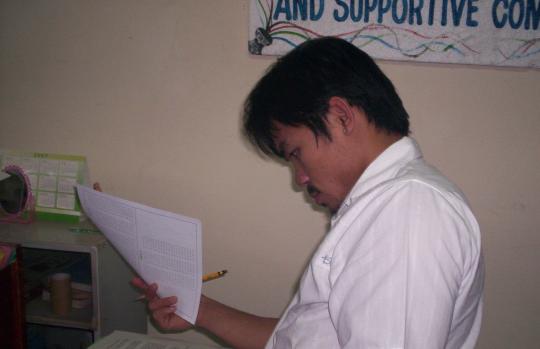
under the Alternative Learning System, after taking the required exam in 2007
Photo by the DepEd
My relationship with the Philippine Department of Education’s (DepdEd) Alternative Learning System is one of ignorance, humiliation and inspiration.
As a young economist joining DepEd back in 2002, I was full of ideas on how to improve the country’s education system. I was coming in as a junior staff for a World Bank-funded project focusing on elementary education in poor provinces.
At around the same time, I had been hearing about this ALS program, which was providing basic education to out of school youth and adults, but I really paid no mind to it. All I knew about it was that it was largely non-formal, that it was conducted periodically through modules and that it was too small to make any significant statistical impact on globally-accepted education performance indicators.
However, over the years, attending all those meetings, reading all those documents and visiting all those schools eventually taught me one simple truth that other Alternative Learning System advocates seemed to have already figured out: for a country like the Philippines, the formal school system cannot provide education for all by itself.
The realization started out slow: school staff saying they couldn’t prevent dropouts no matter what they did; more local governments building learning centers and giving allowances to both mobile teachers and district coordinators; private entities investing in mobile libraries and computer laboratories.
At the same time, the Bureau of Alternative Learning System was starting to get more mobile teachers and literacy volunteers, and was starting to report increasing numbers of enrollees and highschool passers. Even Manny Pacquiao, the pride of Filipino boxing, graduated high school through ALS and was reported to be heading off to college. After that, he went on to be a congressman with a very bright political future.
But the real tipping point in terms of my personal appreciation of ALS happened during my final year in DepEd. While attending a planning session, all participants realized that there have been significant gains in enrolment rates over the years and that there were low dropout rates as well.
While everybody was congratulating each other, I looked at the data and realized that reaching the rest of the population was going to be more difficult moving forward. More importantly, while others said that low dropout rates in formal schools meant that DepEd no longer needed the ALS program, I thought that the exact opposite was true.
Even if dropout rates fall to zero starting today, some form of ALS is still needed over the next 70-80 years to provide relevant education to illiterate, neo-literate and non-certified adults. This is because all the dropouts until yesterday have been accumulating in society year after year after year.
Armed with limited education, these dropouts have been carving a living out of whatever they can and have been building a life wherever they find most convenient. But they may also want to get some form of education --be it for work, for further study or just to be able to read a text message-- but find it difficult to do so. Unfortunately, aside from a few missionary programs for adult learners, ALS is the only systematic nationwide program that offers a second chance to anybody who wants to learn.
It was when I joined the Bank in 2011 that my eyes were finally forced open. Increasing focus not just on disadvantaged areas but also on disadvantaged groups is at the crux of Learning for All. Throughout the Bank, I saw the sustained focus and concrete investments being made for inclusion and social safeguards, not just for education projects but for projects in other sectors as well.
In the Philippines, our main support for ALS begins with a systematic review of the program. I have been in contact with a large number of Alternative Learning System implementers and learners, both from the Central Office and the field, and they have been sharing more insight on the program: its benefits, its potential and of course, its problems.
So far, I found that there is no shortage of feel-good stories of ALS learners’ lives improving because of simply becoming literate or because of the opportunities afforded by a high school diploma. However, it is the commitment and dedication of ALS implementers that inspire me the most. I owe it to them to make sure that we measure the impact of the program accurately and that the program will be even more effective and efficient in the future. I also owe it to them to help change the perspective of traditional education thinkers and policy-makers regarding ALS. Lastly, I owe it to them to work at least half as hard as they do everyday, for the sake of our country.
Have you or somebody you know benefitted from out of school learning? I’d be interested to hear.


Join the Conversation